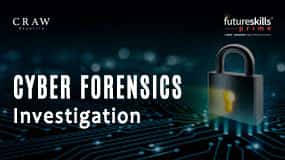Best Ethical Hacking Course in Bangalore, India
July 30, 2023 2025-06-17 11:26Best Ethical Hacking Course in Bangalore, India
Best Ethical Hacking Course in Bangalore
Bestseller
2000+ Student Reviews
- Course Duration : 60 Hours
- Language : Hindi | English
- Course Delivery : Online | offline

FutureSkills Prime Partner (A MeitY NASSCOM Digital Skilling Initiative)
Accredited by NASSCOM, approved by the Government of India
Book a Trial Demo Class
Training Available 24*7 Call at +91 9513805401
About the Ethical hacking Training in Bangalore
Choosing the best possibilities to track down the culprits, whosoever longs for our highly sensitive and confidential type of datasets by any means, either ethical or unethical, is our right. Subsequently, in this context, we sincerely require to know how the fundamentals of cyber security in order to track down the real cyber criminals, whoever is behind all the mess to obtain our datasets via malicious means and intent.
Thus, to understand the devil in detail, we need to submerge ourselves into the in-depth fundamentals of cybersecurity under the prime guidance of a world-class training professional having many years of necessary expertise and experience of so many years.
Book a Trial Demo Class
Training Available 24*7 Call at +91 9513805401
Why Choose Ethical Hacking Course in Bangalore?
People who want to pursue a career in cybersecurity may consider taking an ethical hacking course in Bangalore because it has several benefits that are harder to explain in a single timeframe. Consider taking an Ethical Hacking course in Bangalore for the following compelling reasons:
- Thriving IT Hub,
- Leading Cybersecurity Companies,
- Expert Trainers and Instructors,
- Cutting-Edge Curriculum,
- State-of-the-Art Facilities,
- Networking Opportunities,
- Cybersecurity Conferences,
- Internship and Job Placements,
- Global Exposure,
- Supportive Cybersecurity Community, etc.
Ethical Hacking Course Content
Lesson 01: Intro To Ethical Hacking
Lesson 02: Types of Attacks
Lesson 03: Hacking Methodology
Lesson 04: Cyber Kill Chain
Lesson 05: Types of Attackers
Lesson 06: CIA Traid
Lesson 07: Risk Management
Lesson 08: Cyber Laws
Lesson 01: What is Active Footprinting
Lesson 02: Different kinds of information gathered in Footprinting
Lesson 03: Tools for Active Footprinting = nmap, hping, masscan
Lesson 01: What is passive footprinting
Lesson 02: Footprinting Through Whois
Lesson 03: Footprinting Through Website / Web Services
Lesson 04: Footprinting Through search engine
Lesson 05: Footprinting Through DNS
Lesson 06: Footprinting Through Email
Lesson 07: Footprinting Through Network
Lesson 08: Footprinting Through Social Media
Lesson 09: Tools for Passive Footprinting – Google dorks, shodan, netcraft
Lesson 01: Overview of Network Scanning
Lesson 02: Scanning Methodology
Lesson 03: Host Discovery
Lesson 04: Port Scanning Techniques
Lesson 05: Scanning tools – nmap, netdiscover, arp-scan -1
Lesson 01: Enumeration Concepts
Lesson 02: NetBIOS Enumeration
Lesson 03: SNMP Enumeration
Lesson 04: LDAP Enumeration
Lesson 05: SMTP Enumeration
Lesson 06: DNS Enumeration
Lesson 01: Authentication
Lesson 02: Gaining Access
Lesson 03: Password cracking
Lesson 04: Password Cracking Techniques
Lesson 05: Steganography
Lesson 01: Introduction to Malware
Lesson 02: Types of Viruses
Lesson 03: Types of Worms
Lesson 01: Types of Trojans
Lesson 02: Components Of a Trojan
Lesson 01: Introduction to Botnets
Lesson 02: Characteristics of Botnets
Lesson 01: Introduction to Ettercap and Bettercap
Lesson 02: Practical on Ettercap
Lesson 03: Practical on Bettercap
Lesson 01: Introduction to Wireshark
Lesson 02: Practical on Wireshark
Lesson 01: Types of Social Engineering Attacks
Lesson 02: Human Based Social Engineering Attacks
Lesson 03: Computer Based Social Engineering Attacks
Lesson 04: Mobile Based Social Engineering Attacks
Lesson 01: Practical on zphisher
Lesson 02: Practical on Social Engineering Toolkit (SET)
Lesson 01: DoS/DDoS Concepts
Lesson 02: DoS/DDoS Attack Techniques
Lesson 03: DoS/DDoS Tools
Lesson 04: DoS/DDoS Protection Tools and Techniques
Lesson 01: Session Hijacking Concepts
Lesson 02: Session Hijacking Techniques
Lesson 03: Session Hijacking Tools
Lesson 01: SQL Injection Concept
Lesson 02: Types of SQL Injection
Lesson 03: Working Of SQL Injection
Lesson 04: SQL Injection Methodology
Lesson 01: Practical on sqlmap
Lesson 02: Practical on Ghauri
Lesson 01: Fundamentals of Web Application Security
Lesson 02: Common Vulnerabilities in Web Applications
Lesson 03: Best Practices for Web App Security
Lesson 01: Web Server Hacking Techniques
Lesson 02: Server Rooting Methods
Lesson 03: Securing Web servers
Lesson 01: Wireless Network Basics
Lesson 02: Manual Hacking Techniques for Wi-Fi Networks
Lesson 03: Command Line Tools for Wireless Hacking
Lesson 01: Automated Wireless Hacking Tools
Lesson 02: Wireless Network Exploitation Methods
Lesson 03: Wireless Security Best Practices
Lesson 01: Intrusion Detection System (IDS) Evasion Techniques
Lesson 02: Firewall Evasion Methods
Lesson 03: Stealth and Evasion Tools
Lesson 01: Introduction on Honeypots
Lesson 02: Types Of Honeypots
Lesson 03: Install Of Honeypot (KF Sensor)
Lesson 01: Introduction to Buffer Overflow
Lesson 01: What is cryptography, encryption, decryption
Lesson 02: Types of cipher – substitution (Caesar) and Transposition (rail fence) techniques
Lesson 03: Keys in cryptography – asymmetric and symmetric
Lesson 04: What is encoding
Lesson 05: Example of encoding
Lesson 06: What is hashing
Lesson 07: Example of hashes of a string
Lesson 01: Penetration Testing Overview
Lesson 02: Phases of Penetration Testing
Lesson 03: Reporting and Remediation
Lesson 01: Mobile Security Threats
Lesson 02: Exploiting Mobile Platforms
Lesson 03: Theory of mobile and mobile attacks
Lesson 04: Practical of Androrat
Lesson 01: IoT Concepts
Lesson 02: IoT Hacking Methodology
Lesson 03: IoT Hacking Tools
Lesson 04: IoT Security Tools
Lesson 01: Cloud Computing Concepts
Lesson 02: Cloud Computing Threats
Lesson 03: Cloud Computing Attacks
Lesson 04: Cloud Security Tools
Talk to Our Course Advisor
The Importance of Ethical Hacking Course in Bangalore
In this interconnected era of digital communication, the value of an ethical hacking course in Bangalore can’t be emphasized. The goal of ethical hacking, commonly referred to as penetration testing or white-hat hacking, is to find and address security flaws in computer systems, networks, and applications before malevolent hackers may take advantage of them.
In addition to this, the following are some key reasons why an ethical hacking course in Bangalore holds significant importance:
- Addressing Cybersecurity Challenges,
- Fulfilling Industry Demand,
- Protecting Against Data Breaches,
- Supporting Compliance Requirements,
- Ethical Hacking is Legal,
- Continuous Learning in Evolving Field,
- Contributing to a Secure Digital Ecosystem,
- Career Advancement Opportunities,
- Encouraging Ethical Mindset, etc.
Key Features+
- Introduction to Basics of Ethical Hacking
- In-depth Network Scanning
- System Hacking Password Cracking & Bypassing
- Mobile Hacking
- Web Session Hijacking
- Viruses and Worms, Trojan and Back door, SQL Injection Manual Testing
- Hacking Webservers Server Rooting, Hacking Wireless Network, Penetration Testing: Basics
- Internet of Things (IoT) Hacking, Cloud Security, and many more.
Choose Your Preferred Learning Mode

Classroom Training
We offer customized VILT (Virtual Instructor-Led Training) sessions at your convenient hours to provide effortless training.

Online Training Class

Corporate Training
Hire a preferred trainer at your work premises at your chosen time slots and train your employees with full efficiency.
Ethical Hacking Course Description
Nowadays, the SERPs are highly filled with inquiries related to the “ethical hacking course near me.” Basically, it is a specific training program called an ethical hacking course is created to give people the information and talents needed to spot security flaws in computer systems, networks, applications, and other digital assets
Moreover, penetration testers and white hat hackers, commonly referred to as ethical hackers, use their knowledge to evaluate an organization’s security protocols and strengthen their defenses against online threats.
With regard to choosing the right kind of ethical hacking training institute in Bangalore, learners tend to select Craw Security, the Best Ethical Hacking Training Institute in India, which features its international-standard training faculties having years of quality experience. In addition, the course promotes specialized training standards and utmost glorified characteristics that will certainly help a number of users in becoming proficient ethical hackers in the near future.
Moreover, here are some key factors to consider when selecting an Ethical Hacking Training Institute:
- Reputation and Reviews,
- Accreditation and Certifications,
- Faculty Expertise,
- Course Curriculum,
- Hands-on Training,
- Placement Assistance and Internships,
- Industry Partnerships,
- Batch Size and Individual Attention,
- Flexibility and Convenience,
- Cost and Value,
- Student Support Services,
- Post-Course Support, etc.
Some of the mainstream tools that are covered in the Ethical Hacking Course in Bangalore by Craw Security through the VILT training mode are as follows:
- Nmap,
- Wireshark,
- Metasploit,
- Burp Suite,
- Nessus,
- John the Ripper,
- Aircrack-ng,
- Nikto, and many more.
The trainers at Craw Security firmly support the use of blended learning.
- Learners at Craw Security are instructed by tutors using case studies and real-world projects. Trainers assist students in gaining the most practical understanding possible of various forms of ethical hacking and hackers as a result.
- At Craw Security, the ethical hacking instructors are industrial experts with at least 12 years of networking experience.
- Trainers in ethical hacking are active professionals in the cybersecurity industry.
- Gives students the necessary corporate training while also enhancing their knowledge.
- Trainers provide students with knowledge that is applicable to the workplace.
- Learners are regularly assessed with the necessary individual care.
- The Craw Security’s ethical hackers instructors assist students with resume building and improving their social skills.
As a cybersecurity professional, earning credentials in ethical hacking can greatly increase your credibility and employability. In order to assist you in sorting through your alternatives for an ethical hacking course in Bangalore, here is a certification guide:
- Certified Ethical Hacker (CEH),
- 1 Year Diploma in Cyber Security Course,
- Offensive Security Certified Professional (OSCP),
- Certified Information Systems Security Professional (CISSP),
- Certified Hacking Forensic Investigator (CHFI),
- Certified Penetration Testing Engineer (CPTE),
- CompTIA Security+, etc.
Numerous job opportunities are there for a proficient ethical hacking professional whosoever successfully completes the ethical hacking training in Bangalore from a verified and accredited cyber security training institute like Craw Security.
In this regard, some of the foremost job opportunities a learner would get after completing the ethical hacking course from Craw Security are as follows:
- Ethical Hacker/Penetration Tester,
- Cybersecurity Analyst,
- Information Security Consultant,
- Security Operations Center (SOC) Analyst,
- Security Engineer,
- Web Application Security Specialist,
- Network Security Specialist,
- Cyber Threat Intelligence Analyst,
- Incident Response Specialist,
- Cybersecurity Consultant for Government Agencies,
- Security Auditor,
- Forensics Investigator, etc.
Craw Security has a dedicated Department of Training and Placement that delivers full support to all the successful candidates that complete the 1 Year Diploma in Cyber Security Couse by Craw Security. Apart from the training options delivered by the campus placement or face-to-face interaction sessions at the varied companies, the dedicated Department of T&P at Craw Security will offer the following:
- Personality Development Sessions,
- Group Discussion Sessions,
- English Communication Sessions,
- Industry Connections,
- Job Notifications,
- Resume Building and Interview Preparation,
- Internship Opportunities,
- Career Counseling,
- Company Presentations and Workshops,
- Networking Opportunities,
- Post-Placement Support,
- Special Interaction with Alumni Network,
- Placement Drives, etc.
Craw Security's Students Awarded
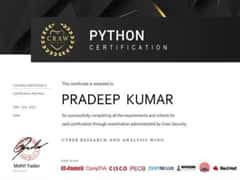
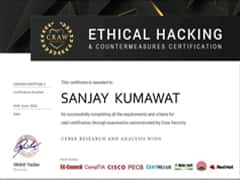
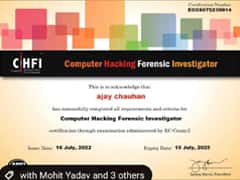
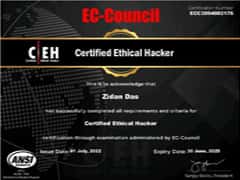
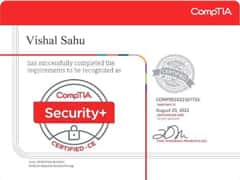
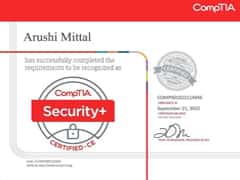
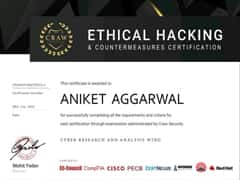
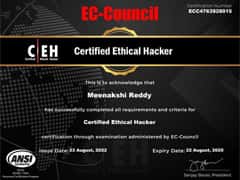
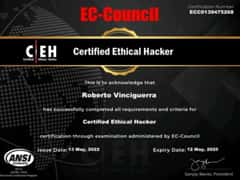

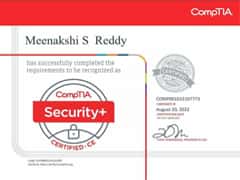
Ethical Hacking Course Eligibility
Related Cyber Security Course
Latest Blogs
What People Are Saying About Craw Security
Google Review (2000+) ★★★★★






Frequently Asked Questions
About Ethical Hacking Course in Bangalore
Following your completion of ethical hacking training in Bangalore, you can choose from a variety of lucrative career paths in the cybersecurity industry. Since Bangalore is a significant IT hub in India, there are many career prospects for cybersecurity specialists there. You have a variety of career alternatives, including the following:
- Ethical Hacker/Penetration Tester,
- Cybersecurity Analyst,
- Information Security Consultant,
- Security Operations Center (SOC) Analyst,
- Web Application Security Specialist,
- Network Security Specialist,
- Incident Response Specialist,
- Cyber Threat Intelligence Analyst,
- Security Engineer,
- Forensics Investigator,
- Security Auditor,
- IT Security Administrator,
- Cybersecurity Manager/Director,
- Chief Information Security Officer (CISO), etc.
Yes, a person needs to fulfill the following criteria to seek admission in this mesmerizing ethical hacking course in Bangalore by Craw Security:
- 12th passed from a recognized board.
- Programming skills knowledge, including the programming languages like Python, Java, C, C++, etc.
- Overview of working models of different operating systems, such as Linux, Windows, Ubuntu, etc.
- Good grasp of networking concepts.
There is no specialized qualification for a hacker, whether there are only skills that a hacker, either a white-hat hacker or black-hat hacker, needs to possess.
However, a person can grasp some vendor-neutral courses from EC-Council, Offensive Security, CompTIA, CISCO, Red Hat Inc., etc., in order to become a fully-fledged hacking professional in this domain of information security.
Apart from it, one may also go for the 1 Year Cyber Security Diploma Course by Craw Security to become a hacker without spending a hefty amount of money on these certifications.
However, for any of the courses from any domain or organization, you just require to give us a call at +91-9513805401.
Some of the best degrees for a hacker are mentioned below:
- Computer Science or Computer Engineering,
- Information Security or Cybersecurity,
- Network Security or Cyber Defense,
- Digital Forensics or Computer Forensics,
- Software Engineering,
- Information Technology (IT) or IT Security, etc.
Most of the famous Cyber Security and Ethical Hacking Courses in Delhi NCR want a Bachelor’s degree (BSc, BTech, BE, BCA) in Information Technology or Computer Science to become an ethical hacker whereas Craw Cyber Security is one of the few institutes that provides its genuine curriculum of Ethical Hacking Course in Delhi with a minimum 10th passed certificate from any recognized board in India.
- Computer Networking Skills.
- Computer Skills
- Linux Skills
- Basic Hardware knowledge
- Cryptography Skills
- Database Skills

